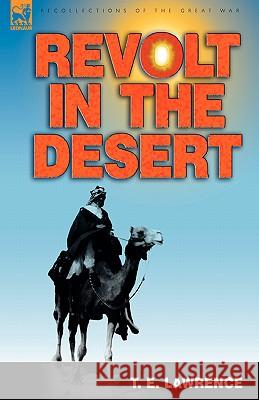Revolt in the Desert » książka
Revolt in the Desert
ISBN-13: 9781846774195 / Angielski / Miękka / 2008 / 328 str.
Revolt in the Desert
ISBN-13: 9781846774195 / Angielski / Miękka / 2008 / 328 str.
(netto: 100,49 VAT: 5%)
Najniższa cena z 30 dni: 84,68
ok. 16-18 dni roboczych.
Darmowa dostawa!
An epic account of the Great War in the Middle East
T. E. Lawrence-Lawrence of Arabia-needs no introduction. His renowned work about his experiences with King Feisal's Arab army as it fought its campaign to Damascus-The Seven Pillars of Wisdom-has become a classic of twentieth century English literature. Revolt in the Desert is not a work of literature, or even a history of the campaign. It is an account of the experiences of one remarkable British officer's war from his own perspective. His was a fluid irregular's war of lightning raids, of blown up railway tracks and trains, ambuscade and-towards the end-of open battle as the defeated Ottoman Turkish Army were harried as they retreated northwards. Here are the Imperial Camel Corps, armoured car squadrons, daring RAF pilots and their aircraft, Ghurkha and Indian infantry and a bevy of 'specialists' who are the forerunners of today's special forces like the SAS. It is, of course, unlike any other straightforward military memoir. Lawrence had an affection for the land, for nature and for the cause of the Arab people that went far beyond the mere liaison his task required. This permeates his writing which-though it provides a linear narrative of the campaign-is nevertheless a work of finely crafted penmanship which is a delight to read not only for military historians, but for everyone who appreciates great writing.
An epic account of the Great War in the Middle East
T. E. Lawrence-Lawrence of Arabia-needs no introduction. His renowned work about his experiences with King Feisals Arab army as it fought its campaign to Damascus-The Seven Pillars of Wisdom-has become a classic of twentieth century English literature. Revolt in the Desert is not a work of literature, or even a history of the campaign. It is an account of the experiences of one remarkable British officers war from his own perspective. His was a fluid irregulars war of lightning raids, of blown up railway tracks and trains, ambuscade and-towards the end-of open battle as the defeated Ottoman Turkish Army were harried as they retreated northwards. Here are the Imperial Camel Corps, armoured car squadrons, daring RAF pilots and their aircraft, Ghurkha and Indian infantry and a bevy of specialists who are the forerunners of todays special forces like the SAS. It is, of course, unlike any other straightforward military memoir. Lawrence had an affection for the land, for nature and for the cause of the Arab people that went far beyond the mere liaison his task required. This permeates his writing which-though it provides a linear narrative of the campaign-is nevertheless a work of finely crafted penmanship which is a delight to read not only for military historians, but for everyone who appreciates great writing.











